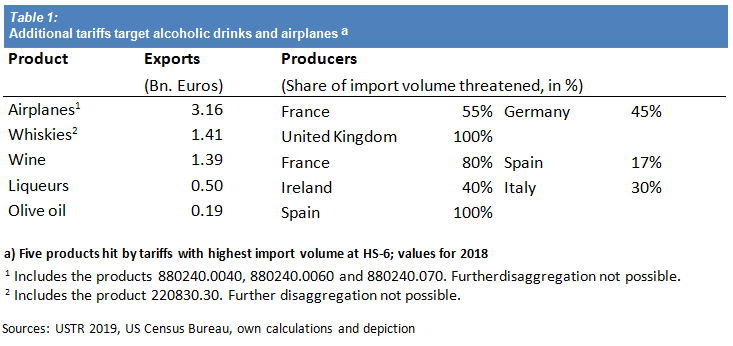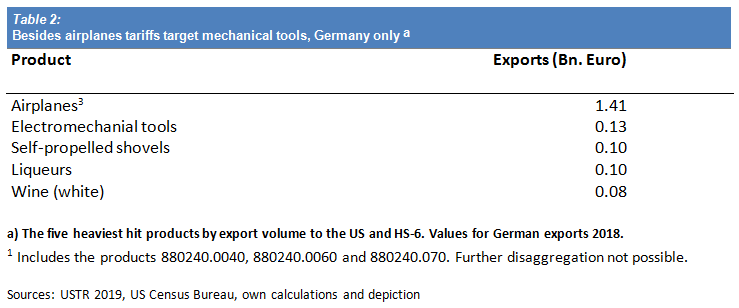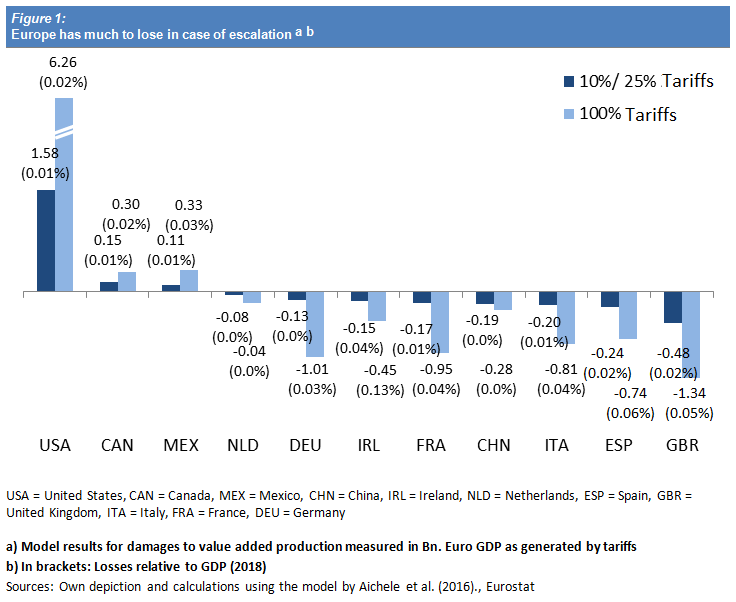Policy Article
Low countervailing tariffs a warning to Europe in Airbus-Boeing conflict

As of October 18th, 2019 the United States will be able to impose tariffs on European aircrafts and a variety of consumer goods including whiskey and wine. This would lead to damages of up to 1.6 Bn. Euro in the member states of the EU. The United States do not make use of their full retaliatory potential and the EU should avoid any escalation of the conflict.
On October 2nd, 2019 the World Trade Organization (WTO) authorized the United States of America to impose countervailing duties against the European Union on imports with a combined value of 7 Bn. Euros (7.5 Bn. USD). Following the arbitration process, the US Trade Representative finalized a list of products subject to additional tariffs beginning October 10th. The WTO has formally accepted this list on October 14th. Hence, the road for tariffs is clear. Additional tariffs of 10% apply to airplanes exceeding a weight of 30 tons and additional tariffs of 25% apply to all other products on the final list. Keeping in mind, that the WTO has authorized countervailing duties up to 100%, the US is not making full use of its retaliatory potential. This in itself, however, does not guarantee that tariffs are imposed on October 18th, 2019.
WTO regulation enables the USA to impose tariffs on any product in the amount of alleged damage from European export subsidies to Airbus. Instead, the US does concentrate on a small set of products and aims for producers in selected countries.
Table 1 shows the five products and the respective production countries most affected by the duties. The import volume of these goods totals 6.65 Bn. Euros.

The duties on airplanes hit exclusively exports from France and Germany, although producers in other countries will be affected through supply chains. Spain and the United Kingdom produce aircraft parts destined for export to the US. These, however, are not subject to additional tariffs. This may well be the intention of the American administration as it incentivizes Airbus to assemble its airplanes in the United States. The tariffs also target alcoholic drinks such as whiskey from the United Kingdom and wine from France as shown in table 1.
As for German products, the most affected by the duties – besides airplanes – are electromechanical tools and self-propelled shovels (see table 2). The five heaviest hit products account for up to 85% of the targeted export volume.

The duties threaten up to 2.13 Bn. Euro exports from Germany to the US. While threatened, the exports will not cease to exist. This is because the US will impose tariffs of 10 % and 25%, but not of the prohibitively high amount of 100%. In fact, this implies an effective tariff rate of 13% for Germany. Hence, the American administration does not make full use of its potential. Lower tariffs, of course, also protect American supply chains and consumers from rapid price increases, but one may also interpret the low tariffs as a last warning to Europe.
Indeed, Germany would have much to lose in case of escalation. As depicted in Figure 1, the currently planned tariff schedule creates damages in Germany of 130 M. Euro GDP only. Losses for the European Union accumulate to 1.6 Bn. Euro. If the US was to impose tariffs of 100%, the damages for Germany alone would reach one billion euro. At the same time, uncertainty over possible tariff increases will have negative effects on the European economies.

The United Kingdom is set to lose most – a result of tariffs on Whiskey. The focus on Whiskey may well be a reaction to European retaliatory tariffs from June 2018, which targeted American Bourbon following Trump’s tariffs on aluminum and steel. American producers of Whiskey will gain relative competitiveness over their European counterparts on the American market and could compensate for lost market share in Europe. Also, the depth of national value added is particularly high for agri-food products. That means that the majority of production steps of Whiskey do occur in the respective country. Therefore, the tariffs can hit the production of a country very precisely. This does not hold for airplanes: Each Airbus-aircraft contains components from the United States. The national value added for French aircrafts, for example, amounts to just a half of the export value (TiVA-Datenbank der OECD, D30 (Other Transport Equipment), series EXGR_DVASH).
Overall, the United States not only adhered to the WTO rules, they also did not make full use of their potential with regard to tariffs. The demands for immediate retaliation by the European Union are, therefore, all the more unwarranted. Any application of past WTO-rulings beyond the Airbus-Boeing dispute, for instance, may justifiably be interpreted by the United States as an act of escalation. It is advisable, to wait for the WTO-arbitrator to complete his/her work in the parallel case on Boeing in 2020. If the WTO rules in favor of the European Union, the EU may then impose tariffs on American avionic industries. This will represent a large enough threat to the US, because Boeing sells more airplanes in the European Union than Airbus does in the United States. This American trade surplus would be at risk. For this reason, one may expect that the parties will reach an agreement early next year following the authorization for countervailing tariffs by the European Union. In the short-run, however, President Trump will not let this opportunity pass to raise tariffs.
References
Aichele, R., G. Felbermayr und I. Heiland (2016). Going Deep: The Trade and Welfare Effects of TTIP Revised, CESifo Working Paper No. 219. München.
Eurostat (2019). Datenbank – Internationaler Warenhandel: https://ec.europa.eu/eurostat/de/web/international-trade-in-goods/data/database. Zugriff am 31.07.2019.
US Census Bureau (2019). USA Trade Online: https://usatrade.census.gov/. Zugriff am 13.09.2019.
USTR (Office of the United States Trade Representative) (2019). Notice of Determination and Action Pursuant to Section 301: Enforcement of U.S. WTO Rights in Large Civil Aircraft Dispute https://ustr.gov/sites/default/files/enforcement/301Investigations/Notice_of_Determination_and_Action_Pursuant_to_Section_301-Large_Civil_Aircraft_Dispute.pdf. Zugriff am 05.10.2019.
Coverfoto: © Airbus/H. Goussé
The Kiel Focus series presents papers on current economic policy topics. Their authors are solely responsible for their content and their views or any policy recommendations they may make do not necessarily represent the views or recommendations of the Institute.